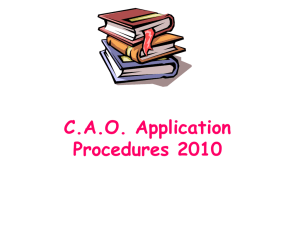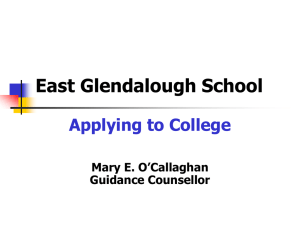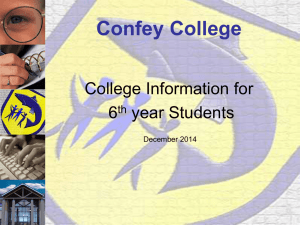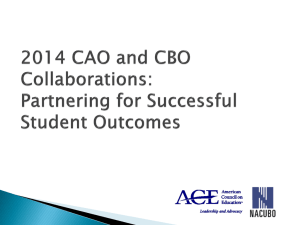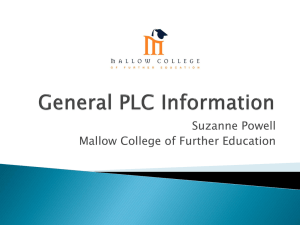- Portumna Community School
advertisement
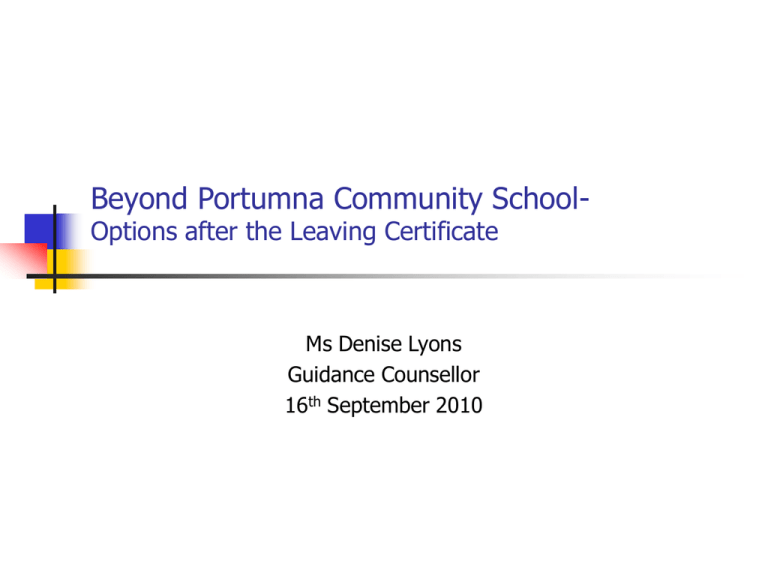
Beyond Portumna Community SchoolOptions after the Leaving Certificate Ms Denise Lyons Guidance Counsellor 16th September 2010 Career Planning and Research Wealth of choices for young people. Very important to plan ahead for future career as someone once said “to fail to plan is a plan failed”. Career Planning and Research can be broken up into two areas: Self Assessment Pathways to Qualifications Self Assessment Honest and realistic Must acknowledge strengths and weakness Skills, qualities and personality Interests and Hobbies Aptitudes Values Work environment Family influence Health considerations Talents- academic and non academic Goals Career interests Pathways to Qualification Must consider: 1. The National Framework of Qualifications 2. Appropriate Level on N.F.Q.: • Third Level (6-10) • PLC (5-6) • Teagasc (5-8) • Failte Ireland (4-8) • Fas (5-6) Available sources of information: College websites Open days/ Career Exhibitions The internet- Eg Qualifax Past and current students/ trainees Parents Career professionals Prospectuses Guidance Counsellor Work Experience/Shadow Taster programmes Third Level Education UK- UCAS IRELAND- CAO UCAS: Universities Colleges Application System Why study in the UK? Popular choice for Irish students- 2010 almost 9,000 students applied Hugh variety of courses/ colleges to choose from 300 + institutions Back up to CAO application Lower entry requirements in many areas of study Applications admitted to courses on the basis of academic and non academic achievements Specialist courses that are not available in Ireland UCAS continued Fees for UK courses o o o o £3,290/year for most UK colleges and Universities in England and N. Ireland Fees for courses in Scotland are around £1800/ year however this may vary Welsh colleges offer a non- means tested grant to EU students which reduces fees to approx. £1600/ year. Must carefully check with each college for actual fee amount www.ucas.com. UCAS continued Student finance The following options are available for student support/ fee payment. All info can be found on www.ucas.com- student finance o Loan- student finance direct o Wales- non means tested grant o England- DFES( Education Authority for EU students o Scotland- SASS( Student loans, financial assistance schemes) o Higher Education Grant Scheme: grants can be obtained for study in the UK by applying to Local County Council in Ireland Other useful websites detailing the above o www.qualifax.ie/ukcourses/ul%20fees.html o www.studentfinance.ie o www.direct.gov.uk UCAS continued Application dates: 1st Sept 2010: 27th Sept 2010: 30th Sept 2010: 8th October 2010: 15th Oct 2010: 3rd Nov 2010: 4th Oct 2010: 15th Jan 2011: 29th Jan 2011: 24th Mar 2011: 3oth June 2011: Opening Date for receiving applications UKCAT Deadline for test registration BMAT Deadline for test registration UKCAT Final date for test Deadline for applications to medicine, dentistry veterinary, veterinary science, Oxford and Cambridge. BMAT test date HPAT Ulster registration date Deadline for applicants from UK/ EU HPAT Ulster test date. Deadline for those Art & Design applications not using 15th Jan deadline. Deadline for “late applications” UCAS continued Application Process: Apply on- line www.ucas.com/apply Max of 5 course choices can be made unless you are applying for the following medicine, dentistry, veterinary medicine or veterinary science in which instance you can apply up to a max of 4 courses. Some courses require you complete an interview or admissions test as part of the application procedure eg UKCAT for Medicine Personal Statement: This must be submitted with course choices. This gives the applicant the opportunity to convince the Admissions Officer that they deserve a place. Students must also complete a section on work experience. A reference from your school must also be supplied to complete application. UCAS continued COST OF APPLICATION: For more information: www.ucas.com www.ukcat.com www.bmat.com £11 for single choice application £21 2-5 choice application Third Level Education in Ireland Third level Institutions in Ireland: Universities, Colleges, Institutes of Technology, Independent Colleges Application to Third Level: Through CAO Steps to applying to CAO: 1. Before application 2. Actual Application 3. Acknowledgement 4. Change of mind 5. Offer 6. Deferred Entry Steps to CAO application Before application: 1. Do lots of research on course, college Entry requirements( Min., specific, points, restricted) Restricted entry- aptitude test, interview, performance test Length of course Content of course Work Experience Study abroad Qualification Opportunities to Post graduate level Employment opportunities HPAT Ireland: Health Professionals Admission Test Used for entry to Medicine courses in Ireland Timeline for HPAT CAO application From 3 November 2010 - 1 February 2011 at 17:15 hours (NB: All medical programmes have the restricted entry final closing date of 1 February) HPAT-Ireland registrations open 4 November 2010 (You will require a 2011 CAO application number to register for HPAT-Ireland) 20 January 2011 Late registrations close (late fee payable) 3 February 2011 at 17:15 hours (No further registrations accepted after this date) HPAT-Ireland test date Saturday 26 February 2011 HPAT-Ireland results released to candidates 27 June 2011 Collation of scores 17 - 21 August 2011 (provisional) Round 1 CAO offers Monday 22 August 2011 (provisional) HPAT continued Fee: Centers: Test: Results: Validity: 95 euro Cork, Dublin, Galway, Sligo, Waterford. 2 ½ hours Sample tests can be viewed on- line Issued in Late June after Leaving Certificate Two years For more information www.hpatireland.com Steps to CAO application 2. Actual application Apply on-line www.cao.ie Cost: 30 euro before 20th Jan 2011 40 euro if made between 20th Jan/ 1st Feb 2011 Closing Date for application 1st Feb 2011. Apply for up to 20 courses 10 Level 6/7 Higher Certificates/ Ordinary Degree 10 Level 8 Honours Degree Choose courses in order of preference Restricted application courses: must apply by 1st Feb 2011 CAO continued 3. Statement of course choices: Feb 5th 2011: On-line facility to amend course choices March 1st: Closing Date for amending course choices April 2011: Interviews, admission tests conducted on restricted application courses 4. Change of mind: May 1st 2011- July 1st 2011 No fee for facility 5. Offers: 22nd August 2011: Round 1 offer CAO will calculate best six grades for points Allocate places in the basis of highest choice on list of courses- this is why order of preference is so important as all other choices will be eliminated 31st August 2011: Proposed 2nd round offer 19th Oct 2011: Offer stage ends CAO continued 6. Deferred entry: Not guaranteed Contact Admissions officer of respective Higher Education Institute with offer notice citing reasons for deferral. For more information: www.cao.ie www.qualifax.ie www.careersportal.ie College websites and prospectuses Further Education courses PLC/ FETAC What is a PLC course: Usually one year in duration Preparation for employment Are specific to a discipline and give vocational, personal, and general skills Include work placement (2-4 weeks) Provide access to third level Cost: No tuition fees Grant available by “The Higher Education Grants Scheme” PLC Application: Direct to college: check entry requirements and closing dates Interview Certification: Awarding body: FETAC (NFQ 1/6) www.fetac.ie Access to Third Level: Progression from Fetac L5/L6 can be made through: 1. Higher Education Links Scheme 2. The Pilot Scheme PLC Higher Education Links Scheme: Provision of reserved places on certain education courses( mainly L8) www.fetac.ie Links to Nursing programmes are via the Higher Education Links 17 colleges/ universities Apply to CAO Places are issued in July of application Best 8 components are scored/ ranked PLC The Pilot Scheme: Progression to Higher Certificate, Ordinary Degrees, and Honours Degrees Under this initiative, most college courses are open to FETAC applicants along with Leaving Cert students Courses can be taken at all the Institutes of Technology, Independent Colleges, NCI, and St Patrick’s College, Thurles. FETAC applicant can score a maximum of 400 points with award Best 8 components are counted: 50 points Distinction 35 points Merit 20 points More information can be accessed on www.cao.ie www.fetac.ie FAS Apprenticeships/ Training Courses Apprenticeships: Apprenticeship is a method by which a person works for an employer in a chosen occupation and learns the necessary skills, knowledge and attitudes to become a qualified craftsperson Follow a specific course of training and undergo a series of assessments Entry requirements: aged 16 and 5 passes in JC. Sponsorship: must be obtained with a registered employer Training: 4yrs duration, 7 phases of training Training allowances paid for duration of training FAS currently offer 23 standard based apprenticeships Qualification: Level 6 (NFQ) FAS Training Courses: Many Fas Training Centres offer full time / part time courses which prepare people for entry into the working world. Register with local Fas office after Leaving Certificate. Interview is required if demand is high for places. Training allowances are given for duration of course. Range in length(10 wks –1yr) FETAC accredited. Contact local Fas centre for lists of available courses. For more information: www.fas.ie Teagasc Agriculture, Horticulture, Equine, Forestry Offers various education and training courses within the NFQ Further Education Training courses: FETAC Level 5/6 Entry through 8 Ag Colleges and at Local Teagasc Centres Nationwide Courses can be taken fulltime/ part-time Higher Education Links Scheme: Holders of FETAC awards can apply for a quota number of higher education courses Apply through CAO Third Level courses: Entry through CAO Courses taken at Institutes of Technologies and UCD Further information: www.teagasc.ie Failte Ireland National Tourism Development Authority There are 4 main categories of education: 1. Skills Training Courses Failte Ireland Training centres nationwide 13/16 week courses Uniform, weekly allowance, training grant FETAC L4 Craft courses Full- time: 2. • • • • Institutes of Technology nationwide 1/ 2 years training Training Grant FETAC L6 Failte Ireland Advanced and Higher Certificate Courses Institutes of Technology Advanced Certificate: 1year day release or 10 week Block: FETAC L6 Higher Certificate: 2 years HETAC L6 Training grant based on attendance Degree courses: Institutes of Technology 3 yr full- time study Bachelor of Business (Culinary Arts or Bar Management) L7 HETAC Grants awarded by Local Authorities and Dept.of Ed- means tested Student Support Schemes In Ireland, there are two main support schemes. These include: Higher Education Grants Scheme Maintenance Grants Scheme for students attending Post Leaving Cert courses These schemes provide means tested grants for students who wish to pursue full-time course. There are three other student support funds in addition to the above: Fund for students with Disabilites Millennium Partnership Fund for Disadvantage The Student Assistance Fund Rules apply and application are made through Local Authority and Local VEC. There is a dedicated website which gives all of the information necessary on financial for further and higher Education www.studentfinance.ie Scholarships and Award In recent years there has been an increase in the number of Scholarships available to students. Scholarships are awarded for high academic achievement, sporting excellence, etc. There are some scholarships that must apply to but there are others that are awarded to students who fulfill certain criteria; DES: 7 Easter Week Commemoration Scholarships (awarded with Leaving Cert) Entrance Scholarships to Third Level: 500+ points (check college prospectus) Sport Scholarships: check college prospectus Women in Technology: check www.intel.ie Access to College www.accesscollege.ie Two new schemes introduced to promote equality of access to Third Level. The two schemes are HEAR (Higher Education Access Route) DARE (Disabilities Access Route Education) HEAR What is the Higher Education Access Route (HEAR) The Higher Education Access Route (HEAR) is a college and university admissions scheme which offers places at reduced points to school leavers from socio-economically disadvantaged backgrounds. HEAR has been set up by a number of colleges and universities as evidence shows that socio-economic disadvantage can have a negative effect on how well a student does at school and whether they go on to college. Who is it for? School leavers who have the ability to benefit from and succeed in higher education and who come from socio economic groups in Irish society that are under-represented in third level education. Applicant Requirements You must give satisfactory evidence of your socio-economic circumstances (family income, schools attended, medical card etc) and meet the minimum entry (matriculation) and subject requirements of the colleges or university to which you are applying.. You will then compete for one of a quota of places based on your Leaving Certificate results. Participating Colleges and Universities: Dublin City University Dublin Institute of Technology NUI Galway NUI Maynooth Trinity College Dublin University College Cork University College Dublin University of Limerick Church of Ireland College of Education Froebel College of Education Colaiste Mhuire, Marino Institute of Education Mary Immaculate College, Limerick Mater Dei Institute of Education National College of Ireland Pontifical University, Maynooth St. Angela's College, Sligo St. Patrick's College, Drumcondra Supports for HEAR Students As well as receiving a reduced points place, HEAR Students may also receive a variety of academic, personal and social supports while studying at third level. Each college and university will decide what supports it can offer depending on its policies, practices and the resources available to it. Examples of the type of supports available include: Orientation programmes to introduce students to university or college Extra tuition if needed Help with study skills and exam preparation One-to-one meetings with student advisors, Social gatherings, Mentoring Advice about grants and scholarships Bursaries when available. You can find more information about the supports available for HEAR students on the access website of each college or university. Procedure for application If you are a school leaver and you wish to be considered for the HEAR scheme, you must: apply online at www.cao.ie as part of the CAO application process by 1 February 2011. say you want to be considered for HEAR in the appropriate section of the application form. Applicants will then be directed to a separate online HEAR application form. complete a number of additional questions relating to: his/her family’s financial situation; employment status of parents; school(s) attended. submit supporting documentation (e.g. P21, Notice of Assessment etc) by 1 April 2011. Closing Dates for HEAR HEAR has strict closing dates so that the CAO and the colleges that take part in the scheme have enough time to process applications. By 1 February 2011: Apply online to CAO and indicate that you wish to apply to the HEAR Scheme. By 1 March 2011: Finalise all elements of your online HEAR Application By 1 April 2011: Submit supporting documentation to the CAO. Next Steps in the Application Process As soon as all applications have been processed to see if they are eligible for the HEAR scheme, you will get a letter telling you if your application has been successful If you are not eligible for HEAR, you will be told why. You can ask for a review of your application if you believe that a mistake was made during the screening of your application. How will I know if I'm eligible? Financial Indicators 1. Income:The total gross income of your parent(s) or guardian(s) for the year ending 31 December 2010 is within the income limits that would make you eligible for a Higher Education Grant. 2. Medical Card: You or your parent(s) or Guardian(s) had a Medical Card or GP Visit Card on 31 December 2010. 3. Social Welfare Payment: In the year ending 31 December 2010, your parent(s) or guardian(s) received a means-tested social assistance payment(s) from the Department of Social Protection for at least 26 weeks in a row.. How will I know if I'm eligible? 1. 2. 3. Social and Cultural Indicators: Socio-economic Group: You belong to a group that is underrepresented in higher education based on the occupation and employment status of your parent(s) or guardian(s). At the moment the group includes non-manual workers; semi & unskilled manual workers and agricultural workers. School: You completed five years in a secondary school that takes part in the Delivering Equality of Opportunity in Schools (DEIS) scheme run by the Department of Education & Skills. Area: You live in an area (urban or rural) in which there is concentrated disadvantage and social exclusion - in other words, an area where, for example, there is high unemployment and poverty and very few facilities for the community. To be eligible for the HEAR SCHEME you must meet the Low Income indicator (no. 1) plus a combination of two other indicators. HEAR 2011 Application Guide ONLINE The Guide and Flyer for 2011 can be downloaded www.accesscollege.ie (September 2010): HEAR 2010 Information Brochure HEAR 2010 Student Flyer HEAR 2010 Application Guide and Workbook DARE The Disability Access Route to Education (DARE) is a college and university admissions scheme which offers places on a reduced points basis to school leavers with disabilities. DARE has been set up by a number of colleges and universities as evidence shows that disability can have a negative effect on how well a student does at school and whether they go on to college. What are the benefits of DARE? Students who are eligible for the Disability Access Route to Education (DARE) may secure a place on a reduced points basis. All students with a disability, irrespective of whether they come through DARE or not, are offered a variety of academic, personal and social supports while studying at third level. Individual institutions will determine the nature and delivery of such supports in accordance with their own policies and practices and subject to the availability of resources. The following are examples of the types of supports available: An orientation programme to introduce students to university/college Study skills, extra tuition if required and exam support Access to assistive technology and training One-to-one meetings with support staff, social gatherings and mentoring How do I apply to DARE? Step 1 You must apply to the CAO at www.cao.ie by 1st February 2011 and indicate that you have a disability/specific learning difficulty on your CAO application form by 1st March 2011. You will then be directed to a separate online Supplementary Information Form which asks for additional information about your disability or specific learning difficulty. Step 2 You must complete Section A (Questions1-4) of the Supplementary Information Form by 1st March 2011. Step 3 You must indicate your wish to be considered for DARE by ticking ‘Yes’ to Question 5 by 1st March 2011. Step 4 You must return the Second Level Academic Reference (Section B) and Evidence of Disability (Section C) to the CAO by 1st April 2011. Supplementary Information Form There are four sections to the Supplementary Information Form which you, your school and an acceptable medical consultant or specialist must complete. Section A – you must complete a Personal Statement which gives your opinion on the academic impact of your disability or specific learning difficulty. Section B – you must return a Second Level Academic Reference completed by your school. This form provides background information on your educational experience and helps to determine appropriate supports at third level. Section C – you must return the Evidence of Disability Form completed by the accepted Medical Consultant/Specialist. This form provides verification of your disability and helps to determine appropriate supports at third level. How will I know if I'm eligible? Applications to DARE are assessed by professionals in participating Higher Education Institutions (HEIs) who have expertise and an in-depth knowledge of the impact of disability on educational attainment. To assess an applicant’s eligibility for DARE, specific criteria have been developed to determine the significance of each disability and the impact on educational attainment. The criteria used for assessing the impact of disability were developed by HEI Assessment Boards, which included HEI professionals and representatives from expert external organisations. Disabilities that are assessed Screening criteria are applied for each disability Asperger’s Syndrome/Autism Attention Deficit Disorder/ Attention Deficit Hyperactivity Disorder Blind/ Vision Impaired Deaf/Hearing Impaired Dyspraxia Mental Health Condition Neurological Conditions - Neurological Conditions - Speech and Language Disabilities Significant Ongoing Illness Physical Disability Specific Learning Difficulties - Dyslexia - Dyscalculia DARE 2011 Application Guide The Guide & Flyer for 2011 can be downloaded from www.accesscollege.com DARE 2010 Information Brochure DARE 2010 Application Guide www.cao.ie www.qualifax.ie


